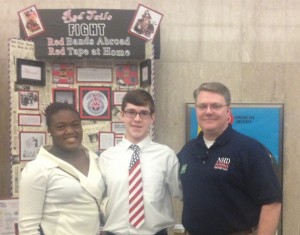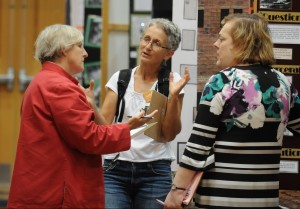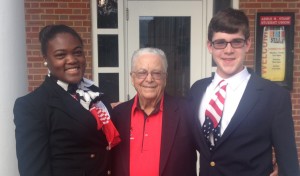Along with her graduate student assistant, Micki Kaleta, Susan O’Donovan, an Associate Professor in the Department of History serves as coordinator for West Tennessee History Day (WTHD). A subsidiary of both Tennessee History Day (THD) and National History Day (NHD), WTHD is an educational outreach program geared towards middle and high school students. This highly successful and ever-growing program always produces interesting projects that help the students learn critical thinking skills, research skills, and communication skills to prepare them for success in college and beyond.
This year, however, was different. One of the projects really stood out to Dr. O’Donovan and Ms. Kaleta. With the support of their teacher, Jeff Golson, Maya Harris and Logan Miller of Dyersburg High School in Dyersburg created a project about the Tuskegee Airmen that combined their interests in military history and aviation. The project was thoughtfully researched and placed 2nd at the WTHD contest and 1st at the THD contest before going on to the national contest held in June at the University of Maryland, College Park.
What really made the project special is that Maya and Logan wrote to all 25 living Tuskegee Airmen to request interviews. Lt. Col. George Hardy was so impressed by their letter that he not only agreed to be interviewed, he flew from his home in Florida to visit Maya, Logan, and their entire school. When Lt. Col. Hardy learned that Maya and Logan had won 1st place at THD and had been invited to showcase their exhibit at the National Museum of American History, he decided that he could not miss that either. The state history day coordinator, Jennifer Core, accompanied the students to the national contest and wrote this about the experience: “So he is here. A Tuskegee Airman. Hanging with our students. Not only has he befriended and encouraged Maya and Logan, he has also introduced them to the other members of his chapter. During the trip, the Washington DC area Tuskegee Airmen hosted Maya and Logan at a dinner and examined their exhibit. Maya and Logan had them sign their THD shirts.” This is a profound experience for all involved and will impact not only Maya and Logan, but other as well, since the pair has raised $2500 for the Tuskegee Airmen’s education fund.
Ms. Core went on to share how important History Day is for students, and also for teachers and administrators of the program: “Maya and Logan have made professional and personal connections that will last them a lifetime. They acquired cognitive skills and exercised their creativity. They learned. According to Maya’s mother, she even started cleaning her room more often. Their teacher feels rejuvenated. Next year, he vows, ALL of his students are participating in History Day.” Mr. Golson commented that, “This is what teaching should be. This is what we are missing.”
istory Day sparks enthusiasm because it is so effective. A study commissioned recently by National History Day confirms that students who participate in the program out-perform their non-history day peers across the board: they are better critical thinkers, they are better problem solvers, they are better readers, they are better students, and they have far better oral and written communication skills. These gains can be measured in their post-collegiate careers. More than five million NHD participants have gone on to positions in business, law, medicine, and academics. In 2011, President Obama conferred a National Humanities Medal on NHD for its success in advancing the study of the humanities.

Maya, Logan, and Mr. Golson with their presentation
This program is also a great opportunity for Ms. Kaleta and all of Dr. O’Donovan’s other students, who are involved in every aspect of the program. Dr. O’Donovan states that, “The graduate assistants who have worked with me share in all these endeavors. I don’t run a hierarchical shop. The work is too important. Micki, her predecessor Caroline Mitchell Carrico (now with the Pink Palace Museum), and her successor, Ashley Dabbraccio, who begins her History Day assistantship this fall, do it all. They are teachers as much as administrators. They judge, they participate in workshops, they field scholarly as well as logistical questions, they mentor both students and teachers, they coordinate between our office and the state office at Nashville, they attend the district coordinator meetings, and they play a very important and central role in the ongoing work of expanding participation in West Tennessee History Day. We would not be enjoying the marvelous gains we’ve witnessed over the past four years if it weren’t for the work these graduate students do. They are an invaluable part of the program.”
The University of Memphis is pleased to support this important work by our dedicated faculty and graduate students, since it is clearly so central to our mission of education and community engagement. The 2016 district contest will take place on Saturday, 27 February 2016, at the University Center. Dr. O’Donovan invites everyone, “Please come. I guarantee you a wonderful experience.”


